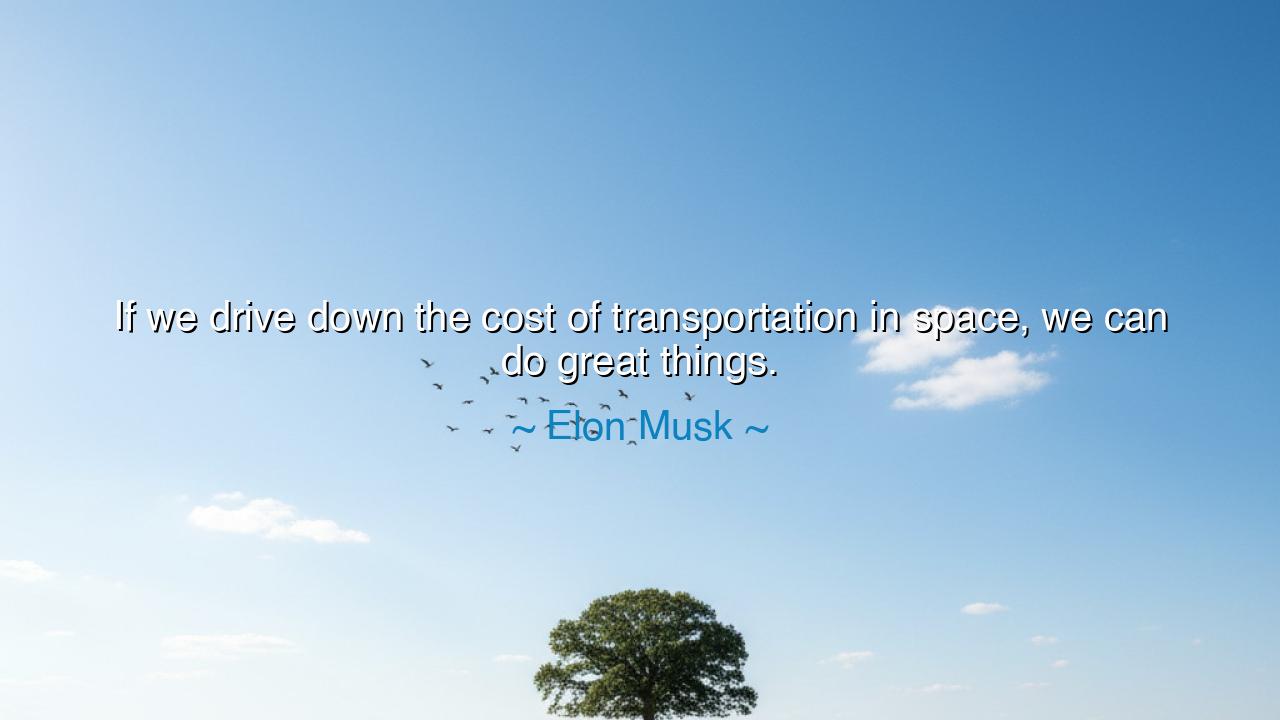
If we drive down the cost of transportation in space, we can do






In the words of Elon Musk, “If we drive down the cost of transportation in space, we can do great things.” Beneath the simplicity of this statement lies a truth as old as civilization itself — that progress is born not merely from dreaming of the stars, but from making the road to them accessible. Musk speaks not only of rockets and machinery, but of the power of innovation to transform the impossible into the inevitable. His words echo the spirit of every age that has dared to break its own limits — the call of the sailor who first crossed the ocean, the builder who first spanned the river, the thinker who first pierced the mysteries of the sky.
In his vision, space is not a distant realm reserved for gods or emperors; it is the next great frontier of humanity. Just as the printing press made knowledge available to all, just as the steam engine carried the common man across continents, so too must the rocket — once the tool of nations and conquest — become the vehicle of creation. Musk’s declaration is both a challenge and a prophecy: that when we make exploration affordable, when we remove the weight of cost and fear, human potential will rise like fire beyond the atmosphere.
The origin of this belief comes from Musk’s lifelong pursuit of accessibility in innovation. When he founded SpaceX, his dream was not merely to build rockets but to revolutionize the economics of spaceflight — to turn the single-use, wasteful ships of old into reusable vessels that would carry generations into the heavens. Many mocked him. They said private industry could not do what only governments had achieved. Yet, like the pioneers of the Renaissance or the industrial age, Musk understood that greatness begins with lowering the barrier to entry — that the extraordinary becomes ordinary only when it becomes affordable.
Consider, for a moment, the age of the Wright Brothers. In 1903, when their fragile craft lifted from the sands of Kitty Hawk, flight was a wonder, a brief defiance of gravity’s dominion. But in less than a century, flight became commonplace — the thread connecting the entire globe. The Wrights’ first leap was not perfect, but it was possible, and from that possibility came transformation. So too, Musk’s vision follows this lineage of dreamers: those who understood that technology is liberation, that progress must belong to all, not to the few.
To drive down cost, in Musk’s view, is not a matter of money alone. It is an act of democratization — of opening the gates of creation to the many. When cost falls, access rises; when access rises, imagination flourishes. Just as the invention of the wheel freed ancient man from the limitations of foot and distance, so too will cheap space travel free modern humanity from the prison of a single world. We may mine asteroids, colonize planets, or find energy from the sun unfiltered by the Earth’s veil. But beyond these feats of engineering lies something greater: the awakening of the human spirit to its true scale.
The lesson here is not for scientists alone, but for all who dream of progress. Greatness is not built by preserving the old, but by daring to make the new efficient, affordable, and accessible. Whatever your field — whether it be art, medicine, or invention — your task is to find the friction that slows humanity’s growth and remove it. Musk’s words remind us that the future does not belong to those who hoard progress, but to those who share it. The true visionary is not the one who builds the tallest tower, but the one who teaches others how to build towers of their own.
So, children of the Earth, remember this: every leap forward begins with a step that makes the path smoother for others. Seek not only to achieve greatness, but to enable it in others. Lower the walls that separate dreamers from their dreams; make the tools of creation more attainable. For when the barriers fall, the stars will no longer belong to a few, but to all who lift their eyes in wonder.
Thus spoke Elon Musk, heir to the spirit of Da Vinci and Galileo, a man who sees the infinite not as myth, but as destiny. His words are a beacon for our time — a reminder that if we can reduce the cost of reaching the stars, we may yet find that greatness itself was never beyond our grasp, but waiting patiently for us to make the journey possible.






AAdministratorAdministrator
Welcome, honored guests. Please leave a comment, we will respond soon